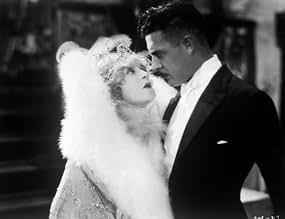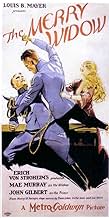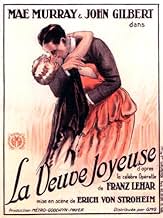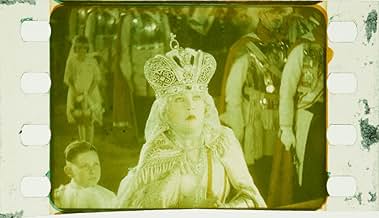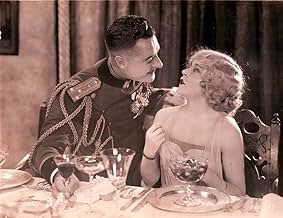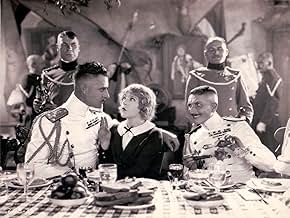AVALIAÇÃO DA IMDb
7,2/10
2,7 mil
SUA AVALIAÇÃO
Adicionar um enredo no seu idiomaA prince must woo the now-wealthy dancer he once abandoned, to keep her money in the country in order to keep it from crashing economically.A prince must woo the now-wealthy dancer he once abandoned, to keep her money in the country in order to keep it from crashing economically.A prince must woo the now-wealthy dancer he once abandoned, to keep her money in the country in order to keep it from crashing economically.
- Direção
- Roteiristas
- Artistas
- Prêmios
- 3 vitórias no total
Gertrude Bennett
- Hard-Boiled Virginia
- (não creditado)
Bernard Berger
- Boy
- (não creditado)
Sidney Bracey
- Danilo's Footman
- (não creditado)
Estelle Clark
- French Barber
- (não creditado)
Albert Conti
- Danilo's Adjutant
- (não creditado)
D'Arcy Corrigan
- Horatio
- (não creditado)
Joan Crawford
- Ballroom Dancer
- (não creditado)
Xavier Cugat
- Orchestra Leader
- (não creditado)
Anielka Elter
- Blindfolded Musician
- (não creditado)
Dale Fuller
- Sadoja's Chambermaid
- (não creditado)
Clark Gable
- Ballroom Dancer
- (não creditado)
Avaliações em destaque
"Manhattan Follies" dancer Mae Murray (as Sally O'Hara) attracts much male attention while touring the "Kingdom of Monteblanco," especially from sexually aggressive John Gilbert (as Danilo Petrovich) and Roy D'Arcy (as Prince Mirko). Soon, Mr. Gilbert's lunging leers turn to love, and Ms. Murray succumbs to his charms. However, Royal rulers Josephine Crowell (as Queen Milena) and George Fawcett (as King Nikita I) are against Gilbert's proposed marriage. Feeling jilted, Murray marries grotesque banker Tully Marshall (as Sixtus Sadoja), who promptly kicks the bucket. Newly rich, Murray becomes "The Merry Widow" of Paris. There, Mr. D'Arcy seems to win her affections, but Gilbert hasn't given up the courtship.
With this film, big-spending director Erich von Stroheim showed he could make an entertaining and innovative crowd-pleaser; his previous "Greed" (1924) had run over-budget (and over eight hours). But, although they had their hoped-for hit, MGM had also had enough of Mr. Stroheim; still, he departed on a high. "The Merry Widow" also helped rejuvenate Murray's fading career, albeit briefly. The cast is superlative, with D'Arcy essaying one of his most memorable roles. Perfectly representing Stroheim's famous foot fetish, Mr. Marshall is one of silent filmdom's forgotten treasures. Most of all, the flicker put Gilbert on the road to superstardom, which he cemented with a winning performance in "The Big Parade" (later in 1925).
Spotting Clark Gable and Joan Crawford as extras isn't as easy as counting Stroheim's foot references.
******** The Merry Widow (8/26/25) Erich von Stroheim ~ Mae Murray, John Gilbert, Roy D'Arcy, Tully Marshall
With this film, big-spending director Erich von Stroheim showed he could make an entertaining and innovative crowd-pleaser; his previous "Greed" (1924) had run over-budget (and over eight hours). But, although they had their hoped-for hit, MGM had also had enough of Mr. Stroheim; still, he departed on a high. "The Merry Widow" also helped rejuvenate Murray's fading career, albeit briefly. The cast is superlative, with D'Arcy essaying one of his most memorable roles. Perfectly representing Stroheim's famous foot fetish, Mr. Marshall is one of silent filmdom's forgotten treasures. Most of all, the flicker put Gilbert on the road to superstardom, which he cemented with a winning performance in "The Big Parade" (later in 1925).
Spotting Clark Gable and Joan Crawford as extras isn't as easy as counting Stroheim's foot references.
******** The Merry Widow (8/26/25) Erich von Stroheim ~ Mae Murray, John Gilbert, Roy D'Arcy, Tully Marshall
Erich von Stroheim has played a neat little trick with 'The Merry Widow'. The first half of the movie plays out like a quirky royal-romance comedy. There are plenty of scenes and gags that could belong to the best comedic works of Howard Hawks. In the second half, the tone changes into more melodramatic, yet the tonal change doesn't take the viewer out of the movie. It actually gives that perfect feel of a mental hangover after the pure love has been ripped into shreds by the cruel world. But the whole film has some sinister undertone - like something is about to happen, but you can't be sure, what it is. Von Stroheim constantly leads his viewers somewhere, allows them to guess, and then - BAM.
John Gilbert is likable as charming Prince Danilo. Mae Murray balances between hammy and sometimes very good performance (someone said, that von Stroheim made actress out from Murray). But Roy D'Arcy is hamming his Crown Prince Mirko up. In a good way. His portrayal of a monocle-wearing sleazy villain blows all previous Erich von Stroheim's performances out of the water.
Like any other von Stroheim's movie, 'The Merry Widow' also suffered from studio interference (some scenes that were cut were quite steamy, probably even for today's standards). I would want to say that 'The Merry Widow' is von Stroheim's weakest work, but again, we can't see his whole vision. The sets are beautiful. Camerawork and editing also something of their own league. Again, you have to admire von Stroheim's attention to small details - lecherous Baron Sadoja's obsession with women's legs, who himself has sick legs.
John Gilbert is likable as charming Prince Danilo. Mae Murray balances between hammy and sometimes very good performance (someone said, that von Stroheim made actress out from Murray). But Roy D'Arcy is hamming his Crown Prince Mirko up. In a good way. His portrayal of a monocle-wearing sleazy villain blows all previous Erich von Stroheim's performances out of the water.
Like any other von Stroheim's movie, 'The Merry Widow' also suffered from studio interference (some scenes that were cut were quite steamy, probably even for today's standards). I would want to say that 'The Merry Widow' is von Stroheim's weakest work, but again, we can't see his whole vision. The sets are beautiful. Camerawork and editing also something of their own league. Again, you have to admire von Stroheim's attention to small details - lecherous Baron Sadoja's obsession with women's legs, who himself has sick legs.
A romantic Prince from tiny Monteblanco attempts to woo THE MERRY WIDOW who once loved him when she was a poor dancer.
Erich von Stroheim, the Teutonic genius who marched through Hollywood's Silent Days like a conquering general, had his final directorial stint at MGM Studios producing this lavish & brilliant film based on the operetta by Franz Lehár. The visuals are striking, with sets that look like actual locations--a mountaintop village; the Castellano Cathedral; Maxim's in Paris--and the occasional bizarre touch--the blindfolded musicians sharing the Prince's seduction bed, for example--which von Stroheim relished. The acting is flawless, with no need for dialogue. The actors' faces speak all that need be said.
Mae Murray & John Gilbert portray the passionate lovers whom Fate (and the plot) contrives to keep apart so successfully. Miss Murray (she and the director loathed each other) powerfully portrays a street-wise performer who, through a series of heartbreaks, becomes a vastly wealthy woman. Gilbert expertly plays a prince whose charm has always gotten him his way. Their scenes together, most particularly the waltz sequences, fairly blaze with unrequited sensual longing and desire.
While it is entertaining to wonder what von Stroheim would have done with the role, it is difficult to imagine anyone better than Roy D'Arcy as the simpering, lusting, sneering Crown Prince; he is pure villainy personified and his eventual fate is absolutely justified. Josephine Crowell gives a fine performance as the Queen. Tully Marshall, one of von Stroheim's favorite character actors, adds another portrait to his gallery of grotesques, this time playing a crippled baron with a foot fetish.
The wonderful organ score which accompanies the film was arranged & performed by Dennis James.
MGM would tackle THE MERRY WIDOW again nine years later and produce a vastly different film, this time directed by Ernst Lubitsch and starring Maurice Chevalier & Jeanette MacDonald.
Erich von Stroheim, the Teutonic genius who marched through Hollywood's Silent Days like a conquering general, had his final directorial stint at MGM Studios producing this lavish & brilliant film based on the operetta by Franz Lehár. The visuals are striking, with sets that look like actual locations--a mountaintop village; the Castellano Cathedral; Maxim's in Paris--and the occasional bizarre touch--the blindfolded musicians sharing the Prince's seduction bed, for example--which von Stroheim relished. The acting is flawless, with no need for dialogue. The actors' faces speak all that need be said.
Mae Murray & John Gilbert portray the passionate lovers whom Fate (and the plot) contrives to keep apart so successfully. Miss Murray (she and the director loathed each other) powerfully portrays a street-wise performer who, through a series of heartbreaks, becomes a vastly wealthy woman. Gilbert expertly plays a prince whose charm has always gotten him his way. Their scenes together, most particularly the waltz sequences, fairly blaze with unrequited sensual longing and desire.
While it is entertaining to wonder what von Stroheim would have done with the role, it is difficult to imagine anyone better than Roy D'Arcy as the simpering, lusting, sneering Crown Prince; he is pure villainy personified and his eventual fate is absolutely justified. Josephine Crowell gives a fine performance as the Queen. Tully Marshall, one of von Stroheim's favorite character actors, adds another portrait to his gallery of grotesques, this time playing a crippled baron with a foot fetish.
The wonderful organ score which accompanies the film was arranged & performed by Dennis James.
MGM would tackle THE MERRY WIDOW again nine years later and produce a vastly different film, this time directed by Ernst Lubitsch and starring Maurice Chevalier & Jeanette MacDonald.
Stroheim's take on the familiar story is filled with his customary pomp and spectacle while never losing sight of the love story at its core. It's something of a slog at over two hours long though, and Gilbert's royal prince comes across as something of a sleaze at times. However, Roy D'Arcy makes a wonderfully hissable villain as the scheming Crown Prince Mirko (a role von Stroheim originally ear-marked for himself).
Merry Widow, The (1925)
*** (out of 4)
Big-budget version of the classic stage production marked the final time MGM would work with director von Stroheim who was hired on for what was suppose to be a short film but he would take it and mold it into a 137-minute epic of sorts. The story is pretty well known but it centers on an American dancer (Mae Murray) who gets stranded in a small town where she meets a Prince (John Gilbert) who quickly falls for her. The two have many troubles throughout their relationship including the King (George Fawcett) objecting. According to legend, MGM offered von Stroheim a $10,000 bonus if he could shoot this movie in a three week period. Each week he was over that the bonus would be sliced by $2,000. Needless to say, it ended up taking four months to shoot and MGM pocketed any bonus money that was to be given out. Apparently this film nearly brought the studio down but it turned out being a hit and the rest is history. von Stroheim certainly has a very sinister look and atmosphere running throughout the film and this is something I'm not sure would be in future versions. Since this is the first version I've seen I really can't compare it to anything but I'm sure fans of the director or silent film buffs will really eat this film up even if it isn't the masterpiece one would hope for considering the talent involved. The highlight is clearly the visual look of the film, which is quite stunning from the opening shot to the final one. There are all sorts of strange camera set ups including my favorite that happens around the fifty-minute mark as Murray and Gilbert are having dinner and the director keeps the camera in a long shot with the two actors sitting at the very right of the screen, nearly off camera. This is such a strange shot that it can't help but grab your attention and make you take notice. There are countless other great trick shots throughout the film and von Stroheim certainly builds a wonderful atmosphere that is quite thick and at times haunting. The performances by the two leads are very good as well with both playing off one another wonderfully. I thought the romantic aspect of the story was fully believable as both actors perfectly nail the more dramatic parts and Gilbert getting a special notice for some nice comic timing. If I had any problem with the film its the running time as I felt there could have been some trims here and there and nothing would have been lost on the story. Apparently Clark Gable and Joan Crawford are extras in the mammoth ballroom sequence but I was unable to spot them.
*** (out of 4)
Big-budget version of the classic stage production marked the final time MGM would work with director von Stroheim who was hired on for what was suppose to be a short film but he would take it and mold it into a 137-minute epic of sorts. The story is pretty well known but it centers on an American dancer (Mae Murray) who gets stranded in a small town where she meets a Prince (John Gilbert) who quickly falls for her. The two have many troubles throughout their relationship including the King (George Fawcett) objecting. According to legend, MGM offered von Stroheim a $10,000 bonus if he could shoot this movie in a three week period. Each week he was over that the bonus would be sliced by $2,000. Needless to say, it ended up taking four months to shoot and MGM pocketed any bonus money that was to be given out. Apparently this film nearly brought the studio down but it turned out being a hit and the rest is history. von Stroheim certainly has a very sinister look and atmosphere running throughout the film and this is something I'm not sure would be in future versions. Since this is the first version I've seen I really can't compare it to anything but I'm sure fans of the director or silent film buffs will really eat this film up even if it isn't the masterpiece one would hope for considering the talent involved. The highlight is clearly the visual look of the film, which is quite stunning from the opening shot to the final one. There are all sorts of strange camera set ups including my favorite that happens around the fifty-minute mark as Murray and Gilbert are having dinner and the director keeps the camera in a long shot with the two actors sitting at the very right of the screen, nearly off camera. This is such a strange shot that it can't help but grab your attention and make you take notice. There are countless other great trick shots throughout the film and von Stroheim certainly builds a wonderful atmosphere that is quite thick and at times haunting. The performances by the two leads are very good as well with both playing off one another wonderfully. I thought the romantic aspect of the story was fully believable as both actors perfectly nail the more dramatic parts and Gilbert getting a special notice for some nice comic timing. If I had any problem with the film its the running time as I felt there could have been some trims here and there and nothing would have been lost on the story. Apparently Clark Gable and Joan Crawford are extras in the mammoth ballroom sequence but I was unable to spot them.
Você sabia?
- CuriosidadesWhile filming the climactic ballroom scene, Erich von Stroheim noticed an extra whose costume was not adjusted to his liking. He stepped off the high camera platform on which he was standing, fell, and broke his leg. He directed the rest of the film from a reclining chair while his leg healed.
- Erros de gravaçãoA title card reads "a prince has a duty to his country higher then [sic] his duty to himself" - a grammatical error unusual for such a prestigious studio as MGM.
- Citações
Prince Danilo Petrovich: Where the devil did you get these pictures?
Danilo's Adjutant: From my barber--he said he got them in Paris.
- Cenas durante ou pós-créditosThe credits state that the film is "personally directed by" Erich von Stroheim.
- Versões alternativasThe version shown on the Turner Classic Movies (TCM) channel has the musical score arranged by Dennis James and performed by him on a Möller pipe organ. It is shown at a proper silent movie speed and runs 137 minutes.
- ConexõesEdited into Histoire(s) du cinéma: Seul le cinéma (1994)
Principais escolhas
Faça login para avaliar e ver a lista de recomendações personalizadas
- How long is The Merry Widow?Fornecido pela Alexa
Detalhes
- Data de lançamento
- País de origem
- Idioma
- Também conhecido como
- The Merry Widow
- Locações de filme
- Empresas de produção
- Consulte mais créditos da empresa na IMDbPro
Bilheteria
- Orçamento
- US$ 592.000 (estimativa)
- Tempo de duração
- 2 h 17 min(137 min)
- Cor
- Mixagem de som
- Proporção
- 1.33 : 1
Contribua para esta página
Sugerir uma alteração ou adicionar conteúdo ausente

